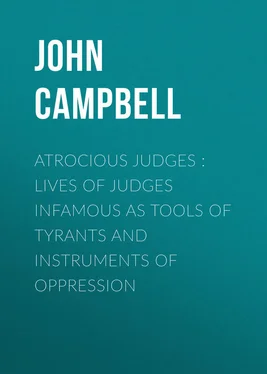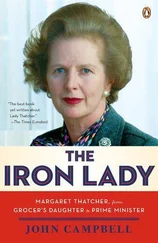John Campbell - Atrocious Judges - Lives of Judges Infamous as Tools of Tyrants and Instruments of Oppression
Здесь есть возможность читать онлайн «John Campbell - Atrocious Judges - Lives of Judges Infamous as Tools of Tyrants and Instruments of Oppression» — ознакомительный отрывок электронной книги совершенно бесплатно, а после прочтения отрывка купить полную версию. В некоторых случаях можно слушать аудио, скачать через торрент в формате fb2 и присутствует краткое содержание. Жанр: foreign_antique, foreign_prose, Биографии и Мемуары, на английском языке. Описание произведения, (предисловие) а так же отзывы посетителей доступны на портале библиотеки ЛибКат.
- Название:Atrocious Judges : Lives of Judges Infamous as Tools of Tyrants and Instruments of Oppression
- Автор:
- Жанр:
- Год:неизвестен
- ISBN:нет данных
- Рейтинг книги:5 / 5. Голосов: 1
-
Избранное:Добавить в избранное
- Отзывы:
-
Ваша оценка:
- 100
- 1
- 2
- 3
- 4
- 5
Atrocious Judges : Lives of Judges Infamous as Tools of Tyrants and Instruments of Oppression: краткое содержание, описание и аннотация
Предлагаем к чтению аннотацию, описание, краткое содержание или предисловие (зависит от того, что написал сам автор книги «Atrocious Judges : Lives of Judges Infamous as Tools of Tyrants and Instruments of Oppression»). Если вы не нашли необходимую информацию о книге — напишите в комментариях, мы постараемся отыскать её.
Atrocious Judges : Lives of Judges Infamous as Tools of Tyrants and Instruments of Oppression — читать онлайн ознакомительный отрывок
Ниже представлен текст книги, разбитый по страницам. Система сохранения места последней прочитанной страницы, позволяет с удобством читать онлайн бесплатно книгу «Atrocious Judges : Lives of Judges Infamous as Tools of Tyrants and Instruments of Oppression», без необходимости каждый раз заново искать на чём Вы остановились. Поставьте закладку, и сможете в любой момент перейти на страницу, на которой закончили чтение.
Интервал:
Закладка:
It being apparent that the confederate lords had a complete ascendency, the accused parties fled. The Duke of Ireland and Sir Nicholas Brambre made an ineffectual attempt to rally a military force; but Chief Justice Tresilian disguised himself, and remained in concealment till he was discovered, after being attainted, in the manner to be hereafter described.
The election for the new Parliament ran strongly in favor of the confederate lords; and, on the day appointed for its meeting, an order was issued under their sanction for taking into custody all the judges who had signed the opinion at Nottingham. They were all arrested while they were sitting on the bench, except Chief Justice Tresilian; but he was nowhere to be found.
When the members of both houses had assembled at Westminster Hall, and the king had taken his place on the throne, the five lords, who were called Appellants, “entered in costly robes, leading one another hand in hand, an innumerable company following them, and, approaching the king, they all with submissive gestures reverenced him. Then rising, they declared their appellation by the mouth of their speaker, who said, ‘Behold the Duke of Gloucester comes to purge himself of treasons which are laid to his charge by the conspirators.’ To whom the lord chancellor, by the king’s command, answered, ‘My lord duke, the king conceiveth so honorably of you, that he cannot be induced to believe that you, who are of kindred to him, should attempt any treason against him.’ The duke, with his four companions on their knees, humbly gave thanks to the king for his gracious opinion of their fidelity. And now, as a prelude to what was going to be acted, each of the prelates, lords and commons then assembled, had the following oath administered to them upon the rood or cross of Canterbury, in full Parliament: ‘You shall swear that you will keep, and cause to be kept, the good peace, quiet, and tranquillity of the kingdom; and if any will do to the contrary thereof, you shall oppose and disturb him to the utmost of your power; and if any will do any thing against the bodies of the five lords, you shall stand with them to the end of this present Parliament, and maintain and support them with all your power, to live and die with them against all men, no person or thing excepted, saving always your legiance to the king and the prerogatives of his crown, according to the laws and good customs of the realm.’”
Written articles to the number of thirty-nine were then exhibited by the appellants against the appellees. The other four are alleged to have committed the various acts of treason charged upon them “by the assent and counsel of Robert Tresilian, that false justice;” and in most of the articles he bears the brunt of the accusation. Sir Nicholas Brambre alone was in custody; and the others not appearing when solemnly called, their default was recorded, and the lords took time to consider whether the impeachment was duly instituted, and whether the facts stated in the articles amounted to high treason. Ten days thereafter, judgment was given “that the impeachment was duly instituted, and that the facts stated in several of the articles amounted to high treason.” Thereupon, the prelates having withdrawn, that they might not mix in an affair of blood, sentence was pronounced, “that Sir Robert Tresilian, the Duke of Ireland, the Archbishop of York, and Earl of Suffolk, should be drawn and hanged as traitors and enemies to the king and kingdom, and that their heirs should be disinherited forever, and that their lands and tenements, goods and chattels, should be forfeited to the king.”
Tresilian might have avoided the execution of his sentence, had it not been for the strangest infatuation related of any human being possessing the use of reason. Instead of flying to a distance, like the duke, the archbishop, and the earl, none of whom suffered, although his features were necessarily well known, he had come to the neighborhood of Westminster Hall on the first day of the session of Parliament; and, even after his own attainder had been published, trusting to his disguise, his curiosity induced him to remain to watch the fate of his associate, Sir Nicholas Brambre.
This chivalrous citizen, who had been knighted for the bravery he had displayed in assisting Sir William Walwort to kill Wat Tyler and to put down the rebellion, having been apprehended and lodged in the Tower of London, was now produced by the constable of the Tower, to take his trial. He asked for further time to advise with his counsel, but was ordered forthwith to answer to every point in the articles of treason contained. Thereupon he exclaimed, “Whoever hath branded me with this ignominious mark, with him I am ready to fight in the lists to maintain my innocency whenever the king shall appoint!” “This,” says a chronicler, “he spake with such a fury, that his eyes sparkled with rage, and he breathed as if an Etna lay hid in his breast; choosing rather to die gloriously in the field, than disgracefully on a gibbet.”
The appellants said “they would readily accept of the combat,” and flinging down their gages before the king, added, “We will prove these articles to be true to thy head, most damnable traitor!” But the lords resolved “that battle did not lie in this case; and that they would examine the articles with the proofs to support them, and consider what judgment to give, to the advantage and profit of the king and kingdom, and as they would answer before God.”
They adjourned for two days, and met again, when a number of London citizens appeared to give evidence against Brambre. For the benefit of the reader, the chronicler I have before quoted shall continue the story: —
“Before they could proceed with his trial, they were interrupted by unfortunate Tresilian, who, being got upon the top of an apothecary’s house adjoining to the palace, and descended into the gutter to look about him and observe who went into the palace, was discovered by certain of the peers, who presently sent some of the guard to apprehend him; who entering into the house where he was, and having spent long time in vain in looking for him, at length one of the guard stepped to the master of the house, and taking him by the shoulder, with his dagger drawn, said thus: ‘Show us where thou hast hid Tresilian, or else resolve thy days as accomplished.’ The master, trembling, and ready to yield up the ghost for fear, answered, ‘Yonder is the place where he lies;’ and showed him a round table covered with branches of bays, under which Tresilian lay close covered. When they had found him they drew him out by the heels, wondering to see him wear his hair and beard overgrown, with old clouted shoes and patched hose, more like a miserable poor beggar than a judge. When this came to the ears of the peers, the five appellants suddenly rose up, and, going to the gate of the hall, they met the guard leading Tresilian, bound, crying, as they came, ‘We have him, we have him.’ Tresilian, being come into the hall, was asked ‘what he could say for himself why execution should not be done according to the judgment passed upon him for his treasons so often committed;’ but he became as one struck dumb; he had nothing to say, and his heart was hardened to the very last, so that he would not confess himself guilty of any thing. Whereupon he was without delay led to the Tower, that he might suffer the sentence passed against him. His wife and his children did with many tears accompany him to the Tower; but his wife was so overcome with grief, that she fell down in a swoon as if she had been dead. Immediately Tresilian is put upon an hurdle, and drawn through the streets of the city, with a wonderful concourse of people following him. At every furlong’s end he was suffered to stop, that he might rest himself, and to see if he would confess or acknowledge any thing; but what he said to the friar, his confessor, is not known. When he came to the place of execution he would not climb the ladder, until such time as being soundly beaten with bats and staves he was forced to go up; and when he was up, he said, ‘So long as I do wear any thing upon me, I shall not die;’ wherefore the executioner stript him, and found certain images painted like to the signs of the heavens, and the head of a devil painted, and the names of many of the devils wrote in parchment; these being taken away he was hanged up naked, and after he had hanged some time, that the spectators should be sure he was dead, they cut his throat, and because the night approached they let him hang till the next morning, and then his wife, having obtained a licence of the king, took down his body, and carried it to the Gray-Friars, where it was buried.”
Читать дальшеИнтервал:
Закладка:
Похожие книги на «Atrocious Judges : Lives of Judges Infamous as Tools of Tyrants and Instruments of Oppression»
Представляем Вашему вниманию похожие книги на «Atrocious Judges : Lives of Judges Infamous as Tools of Tyrants and Instruments of Oppression» списком для выбора. Мы отобрали схожую по названию и смыслу литературу в надежде предоставить читателям больше вариантов отыскать новые, интересные, ещё непрочитанные произведения.
Обсуждение, отзывы о книге «Atrocious Judges : Lives of Judges Infamous as Tools of Tyrants and Instruments of Oppression» и просто собственные мнения читателей. Оставьте ваши комментарии, напишите, что Вы думаете о произведении, его смысле или главных героях. Укажите что конкретно понравилось, а что нет, и почему Вы так считаете.












